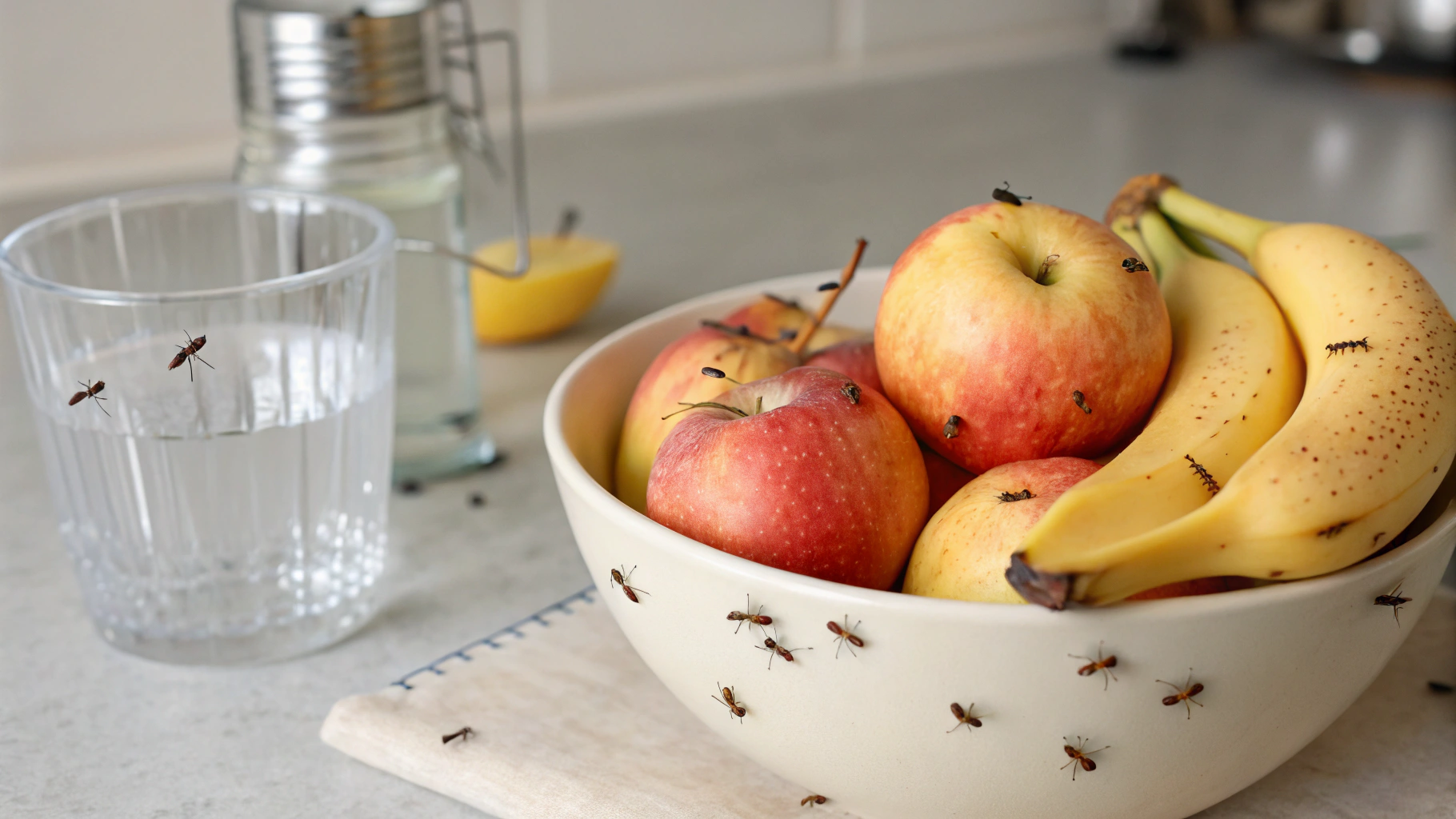Fruit mosquitoes, more commonly known as fruit flies, are tiny insects that invade kitchens, garbage cans, compost bins, and even drains, especially when ripe or rotting produce is present. Despite their size, they cause a major nuisance and multiply quickly. Knowing how to get rid of fruit mosquitoes requires not only removing existing pests but also tackling their breeding sources. According to trusted publications such as Healthline – “How to Get Rid of Fruit Flies” and Gardeningetc – “How to Get Rid of Fruit Flies”, understanding their life cycle is the first step to prevention and control. These experts highlight the importance of cutting off their food and breeding supply to achieve lasting results.
What Causes Fruit Mosquito Infestations?

Fruit mosquitoes thrive where sugary or fermenting substances are found. They are drawn to bananas on the counter, unwashed dishes, beer cans, candy wrappers, and even damp mops left forgotten. Understanding these attractants helps you manage the situation at its source.
1. Overripe Fruits
When fruits such as bananas, apples, or peaches ripen, they produce ethanol and sweet aromas. Fruit mosquitoes pick up on these scents and rush toward them. If you leave fruit uncovered, you create a prime breeding ground.
2. Wet or Dirty Surfaces
Fruit mosquitoes also breed in moist organic matter found in garbage bins, drains, or cleaning cloths. For this reason, regular cleaning and drying of kitchen spaces go a long way in prevention.
3. Slow-Draining Sinks
The organic residue inside drains provides both moisture and food, making sinks another hidden pest environment. Scrubbing and flushing drains is crucial if you want to truly get rid of them.
Proven Prevention Strategies
Eliminating fruit mosquitoes starts with prevention. Instead of only reacting once they’ve spread, cut off their main entry points and make your home less attractive.
Store Produce Correctly
- Keep ripening fruit inside the refrigerator.
- Use sealed containers for cut or overripe produce.
- Avoid large fruit piles on countertops during warm weather.
Maintain a Clean Kitchen
Wipe counters with vinegar-based cleaners. Empty kitchen bins often—daily if needed. Wash dishes promptly instead of leaving them overnight. Each of these actions reduces food and moisture sources that fruit mosquitoes target.
Seal Entrances
Tiny insects can fly through window gaps. Use fine mesh screens and seal cracks to keep them outside. While not foolproof, this defensive step helps lower the number entering your kitchen.
Effective Removal Methods
Once fruit mosquitoes appear, you need a multi-step approach to get rid of them. Quick fixes may seem helpful for a day, but a long-term solution requires addressing adults and breeding zones.
Apple Cider Vinegar Traps
Fill a small bowl with apple cider vinegar, cover it with plastic wrap, and poke tiny holes in the top. The sweet scent attracts fruit mosquitoes, and once they enter, they cannot escape. This is one of the most widely recommended remedies by Healthline experts.
Red Wine or Beer Traps
Similar to vinegar, leftover wine or beer also attracts these insects due to their fermenting sugars. Small cups placed near infestation zones can lower adult mosquito numbers quickly.
Boiling Water for Drains
If you see mosquitoes around your sink, pour boiling water down the drain. Pair this treatment with scrubbing and cleaning agents to clear food debris. For extra strength, baking soda followed by vinegar helps eliminate organic buildup.
DIY Fruit Jar Trap
Create a simple trap by placing a piece of ripe fruit at the bottom of a jar. Cover the opening with a paper cone, ensuring a narrow end points inside. Fruit mosquitoes fly in easily but struggle to escape.
Natural Remedies vs. Chemical Solutions

When learning how to get rid of fruit mosquitoes, you might wonder whether to choose natural remedies or chemical sprays. Both have benefits and limitations.
Natural Approaches
- Low-cost and safe for children and pets.
- Easy to set up using household ingredients.
- Environmentally friendly, with no aerosol residues.
Chemical Options
- Fast-acting sprays kill adult mosquitoes instantly.
- However, they do not address hidden eggs and larvae.
- Potential risks for allergies, asthma, or sensitive pets.
Experts recommend natural solutions as the first step, using sprays only in serious infestations that don’t respond to organic traps.
Long-Term Control and Prevention Tips
To ensure fruit mosquitoes don’t return, you need ongoing maintenance. These pests breed quickly, so skipping preventive steps allows future outbreaks.
Make a Cleaning Schedule
Clean dishes daily, take trash out every evening, and wash fruits immediately when you buy them. Such routines reduce unnoticed food sources.
Maintain Compost Responsibly
If you compost food scraps, keep bins sealed and stir piles frequently. Consider adding shredded newspaper to absorb excess moisture and odors.
Use Essential Oils
Certain oils such as lemongrass, peppermint, and eucalyptus act as natural deterrents. Use them in sprays or diffusers around the kitchen as part of a holistic solution.
Frequently Asked Questions
How long do fruit mosquitoes live?
Typically, adults live for about two weeks. However, in that short time, they can lay hundreds of eggs, making swift action important.
Are fruit mosquitoes harmful?
While they don’t bite, they can contaminate food surfaces with bacteria carried from drains, garbage, and decaying matter.
Will fruit mosquitoes just go away on their own?
No. Because they breed continuously when food and moisture are present, ignoring them allows the problem to worsen.
What’s the fastest way to kill them?
Traps using apple cider vinegar or red wine typically show results within hours, but pairing traps with preventive cleaning achieves longer-lasting control.
In conclusion, learning how to get rid of fruit mosquitoes involves a mix of rapid removal methods and careful prevention strategies. By following trusted guidance from resources such as Healthline and Gardeningetc, and staying consistent with cleaning routines, you can finally enjoy a pest-free kitchen while protecting your home from future infestations.




GIPHY App Key not set. Please check settings